Animal Welfare Updates: August - October 2023
Animal Welfare Organizations Gather in Rwanda to Confer on Actions Taken to Achieve Sustainable Development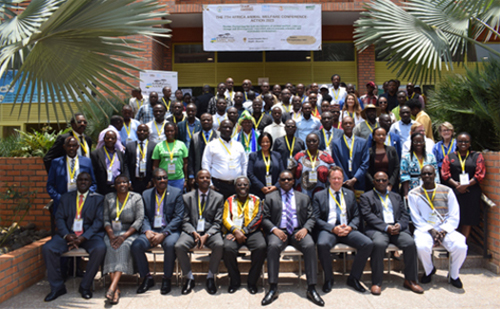
Delegates Attend the 7th Africa Animal Welfare Conference - Action 2023 in Kigali, Rwanda
Africa sat underneath the great baobab tree, shaving shells and popping macadamia nuts in her mouth as the sun shone brightly on the beautiful landscape in the final season of a hard but productive year. She leaned back against the tree in comfort, knowing that, though challenging, she was doing all she could to ensure good welfare of her animals. Much had been said, much had been done. It was once again time to gather her people, this time, to map out concerted actions towards healthy and sustainable development in an effort to navigate the delicate balance of animal welfare, climate change and development. Farm animals, domestic animals, companion animals, working animals, animals in science, and wild animals found within the continent of Africa were the subject of focus for the animal welfare, environment and wildlife conservation fraternity who gathered at the 7th Africa Animal Welfare Conference - Action 2023 from September 25 to 27, 2023 at Sainte Famille Hotel in Kigali, Rwanda. The conference was hosted by the Government of Rwanda, United Nations Environment Programme (UNEP), Africa Union – InterAfrican Bureau for Animal Resources (AU-IBAR) and Africa Network for Animal Welfare (ANAW). With deep gratitude, the co-hosts acknowledge that many partner organization came on board to support the conference with financial, and technical resources. This crucial annual event brought together 741 delegates from 38 countries across the world with 195 participating physically and 546 joining the proceedings online. The conference drew dignitaries, government leaders, global leaders in animal welfare and environment conservation, intergovernmental agencies, veterinary and animal health practitioners, researchers, academia, community representatives, and environmental practitioners. The event was formally opened and closed by Dr Olivier Kamana, Permanent Secretary in the Ministry of Agriculture and Animal Resources of the Republic of Rwanda. Following the grand success of the conference, gratitude is heartily given to the United Nations Environment Program (UNEP), African Union Inter African Bureau for Animal Resources (AU-IBAR) the Rwandan Government through the Ministry of Agriculture (MINAGRI), the Rwanda Council of Veterinary Doctors (RCVD), and the Rwanda Convention Bureau (RCB) as the co-hosting partners. Special thanks also to Animal People, Compassion in World Farming, Animal Welfare Institute (CIWF), Plants-4-Hunger, World Animal Protection, The Society for The Protection of Animals Abroad (SPANA), Welttiershutz-stiftung (WTS), The African Fund for Endangered Wildlife- Giraffe Centre (AFEW), and The Donkey Sanctuary for making the conference possible through their financial support. We appreciate all the delegates, represented media houses, Sainte Famille Hotel and all stakeholders that worked together to achieve this success. Over 5,000 Animals Vaccinated During Mass Anti-Rabies Campaign with the Julie Kelly Team of International Veterinary Volunteers and Doctors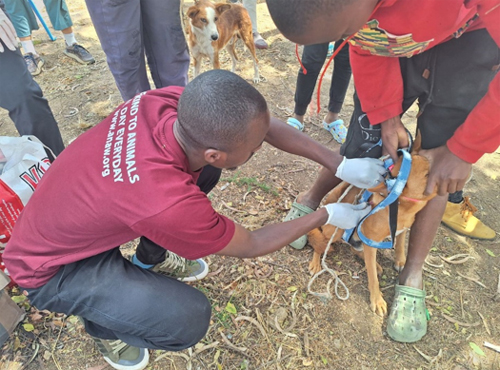
A Community Member Holds Her Dog in Place to Enable the Veterinarian to Vaccinate the Dog In hotspot Kenyan counties where rabies is prevalent, community members take every opportunity to protect their animals against the fatal zoonotic disease. When the Julie Kelly Team of International Veterinary Volunteers and Doctors arrived early morning at the shopping centers to vaccinate, deworm and treat, queues of people were already waiting in line. Partnering with Machakos and Taita Taveta counties, ANAW in collaboration with a group of veterinarians and volunteers led by Dr. Julie Kelly held mass rabies vaccination campaigns. This campaign was part of activities aimed at eliminating human dog-mediated rabies in Kenya by the year 2030 as per the Strategic Plan for the Elimination of Human Rabies in Kenya (2014 – 2030). In partnership with the respective County Veterinary Officers, the 5-day mass rabies intervention vaccinated 5387 animals (3366 dogs, 348 cats and 1673 donkeys) in Machakos and Taita Taveta Counties. Animal Welfare Organizations Commit to Elevate Animal Welfare in Africa
Animal Welfare Organizations Represented at a Consultative Breakfast Meeting at Radisson Blu Hotel - Nairobi, with the Ministry of Agriculture & Livestock Development The Animal Welfare Action Kenya (AWAKE) - a consortium of Animal Welfare Organizations, to which ANAW is a member, held a successful consultative breakfast meeting at Radisson Blu Hotel - Nairobi, on August 8, with the Ministry of Agriculture & Livestock Development to advance Animal Welfare agenda in Kenya. The gathering served as a platform for open and constructive dialogue, facilitating the exchange of ideas and strategies to elevate animal welfare standards. In a joint statement addressed to the ministry, the AWAKE umbrella organizations expressed their commitment to promoting animal welfare, recognizing its far-reaching implications for public health, disease control, and sustainable development. The statement also emphasized the need for collaborative efforts between the government and animal welfare organizations to achieve these shared objectives. "AWAKE thus needs a lot of government support to build a community of practice that will be a critical pillar even in the implementation of government policies in the private - public partnership and in the spirit of Sustainable Development Goals - 17 (SDG 17) of partnerships and leaving no one behind,” read part of the joint statement. Mortality Cases of Green Turtles Increase in Funzi Island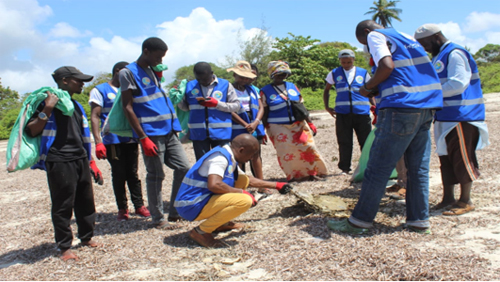
Monitor Abdallah Taking a Record of the Dead Turtle Poaching of Green Turtles by fishermen at the coast presents a challenge for coastal dwellers in their efforts to protect the species. Cases of by catch have been on the increase. Mr. Bakari Zonga a monitor from Funzi turtle watch expressed the unfortunate cases of turtle loss they have been experiencing at Funzi since March. He reported that they have recorded seven (7) mortality cases caused by poaching, by catch by fishermen and other natural causes. During beach patrols in August, September and October, Msambweni Turtle Monitors inspected and excavated two nests that hatched. They collected data on eggs that successfully hatched and those that were unsuccessful. Funzi Turtle Watch observed cases and causes of mortality. Interestingly, in October, the Msambweni Turtle Conservation Group held meetings with Olive Ridley project and had a training on plastic management and a separate one with representatives from Kwale county government regarding a proposal for a social all for the Msambweni community. Media Workshop on Cage-Free Chicken Farming Held in West Africa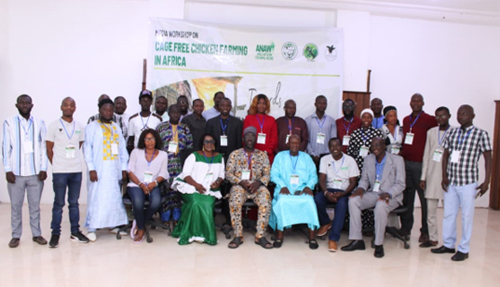
Group Photo: Participants Pose for a Photo During the Cage-free Media Workshop, in Banjul City, The Gambia On September 12, 2023, in the City of Banjul (formerly Bathurst) - The Gambia, something big on chicken welfare was reverberating and reigning on the small West African country’s airwaves. ANAW in partnership with The Gambia Press Union, The Gambia’s Ministry of Livestock Services, The Gambia Veterinary Council, The Gambia Animal Welfare Advocacy Association, The Gambia National Poultry Farmers’ Cooperative and The Gambia National Farmers Platform supported by Open Wing Alliance (OWA), conducted an impactful Media Workshop on Cage-free Chicken Farming themed, “Towards a Cage-Free Continent”, at Paradise Suites Hotel attended by 35 journalists. The workshop was aimed at bringing together all media houses (print, electronic and online) in The Gambia for chicken welfare sensitization, with a goal of informed reporting of chicken welfare related stories by the media especially focusing on the campaign against battery cages in Africa. Declaring the workshop open in his keynote speech, Dr Abdou Ceesay, The Gambia’s Director General, Department of Livestock Service, while acknowledging the key role media plays in informing the masses, he urged the scribes to use the knowledge gained from the workshop training to report impactfully on promotion of animal welfare. He further lauded ANAW for organizing this one-of-a-kind gathering of the journalists and editors to discuss chicken welfare, which he said was a major concern in his ministry. “We recognize the need to catch up with the increasing demand of poultry and poultry products in our developing world, especially in Africa. However, we should carefully consider the other side of the coin – while we heavily rely on our chickens to provide for our welfare in terms of nutrition and health, we should also endeavor to do whatever it is possible to improve the welfare of these animals, too.” He admonished. On battery cages, he opined, “It is without a doubt that one of the greatest shortcomings of the battery cage system is the confinement of birds resulting in repudiation of most of the five freedoms. Like any other animals, birds are supposed to enjoy their natural behaviors such as scratching, sandbathing, exercising, perching and wings flapping among others. That is where you – the journalists come in, to help educate the masses and farmers to consider using chicken welfare friendly methods in their farming ventures.” In his remarks, The Gambia Press Union President, Amodou Jallow offered, “We commit ourselves to using our influence to drive the right message through all possible mediums on the suffering of chickens and their overall welfare. Many of us didn’t know how dire the welfare situation was on chickens. Through this workshop we have learned - now we know, and we will use the power of pen to especially influence policy change on chicken rearing and handling.” In his welcome remarks delivered from Prague, Czech Republic while attending the OWA Global Summit, ANAW’s Acting Executive Director, Josiah Ojwang, passionately appealed to the members of the fourth estate to do what journalism should do; to shine a light on a dark place and expose the suffering of the helpless and voiceless; in this case, the chickens. “We urge you today, to use your profession skillfully to inform, educate and influence the masses as well as policy makers for a better chicken welfare, hoping that one day - with our combined tireless efforts, in this campaign, Africa will get rid of cages and our chickens will be free, at last” he said. A Giraffe’s Medical Condition Examined and Investigated as Desnaring Takes Place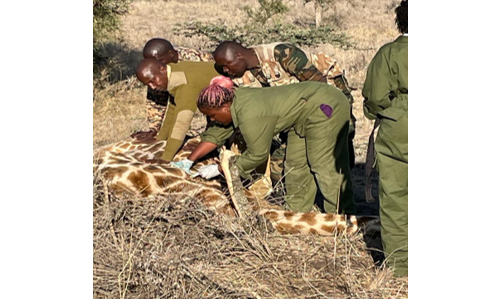
The Veterinarian Examining and Treating the Giraffe In Kenya, structures for monitoring, direct intervention and recovery are in place in the instance domestic animals, working animals and companion animals fall sick or sustain injuries. Providing medical services for animals in the wild requires a unique set of skills and care. Examining and monitoring the wildlife can only be done at a distance and emergency intervention are done in the wild. An early diagnosis cannot be made on animals perceived to be seriously and probably terminally ill. By the time the illness is detected, for example, when an animal does not eat, it is already too late. However, wildlife ranger patrols are undertaken to understand behaviors and patterns. This was done when the Africa Network for Animal Welfare (ANAW) desnaring team partnered with Kenya Wildlife Service (KWS) veterinary unit to attend to a male giraffe with a swelling on the lower jaw. The giraffe was darted, the swollen mass was analysed and a sample from the swollen area was taken to lab for further analysis. The outcome is yet to be determined. In October 2023, a two-day de-snaring exercise was carried out at Machakos County ranches by a team of members from ANAW, KWS security personnel and Manzoni ranch scouts. The exercise was carried out at Kwa Kyelu and Manzoni ranches and Muthwani area. 40 live snares and five (5) dead snares were lifted during the exercise. Support Our Work Here's a great way to support Africa Network for Animal Welfare (ANAW) to protect present and future generations of animals. You can do so through the following ways: A Donation A Legacy in Your Will |
||
